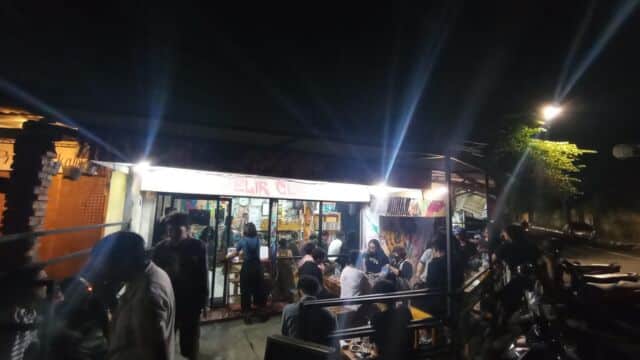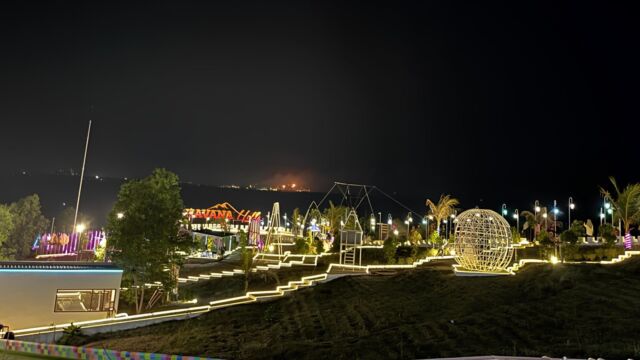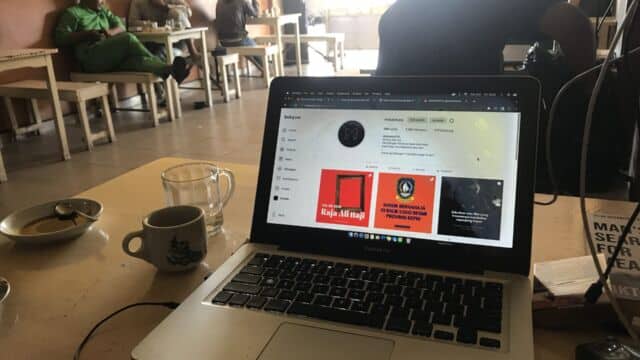The Cost of Free Parking
Photo: Fikry Ainul Bachtiar
A convenience store parking lot | 2,500 words | Translated from Bahasa Indonesia by Lise Isles
‘But haven’t you got two thousand on you? Earlier in the kost, remember, I put some spare change in your purse!’
I say it while looking into the motorbike’s side mirror, awaiting the response of the woman sitting behind me on the back of the bike seat.
‘Huh? What?’ My girlfriend has seemingly not heard what I said. I let out a snort: I thought my voice had been loud enough. It’s true that our helmets, together with the breeze created by the bike’s forward movement, are obstructions to hearing. I look through the bike’s side mirror: she appears to be daydreaming, absorbed in her own thoughts.
Faintly, I hear a second part to her answer: ‘if you want to talk, let’s talk at the convenience store!’
Earlier, we had found the ATM at our local supermarket broken: we couldn’t get any cash out and consequently had to cancel our shopping there. I had then proposed we visit our usual convenience store, which also has an ATM.
In the supermarket parking lot, I had been readying the motorbike to leave when a youth, wearing a black-and-orange camouflage shirt with a vest over it, like a photographer, came up from behind us, and pulled on the back-seat handle of our bike. He had a whistle which he blew on, shrilly.
My hand had rifled through my pants pocket, seeing if perhaps there were a few coins. Empty. I had glanced at my girlfriend – got any change? She had shrugged her shoulders – nope. Then she had pinched my waist and whispered: ‘just take off’.
The parking attendant was holding out his right hand, awaiting money. I told him we might come back later after getting money from the ATM. ‘You don’t have to!’ my girlfriend hissed. ‘There’s a sign right there that says “Free Parking”’, she said, pointing.
Finally, I had accelerated and sped off, even though I felt intensely awkward. As we gathered distance I could just hear a tirade, yelled in a very coarse Sundanese: ‘Really, not even two thousand?! There’s no such thing as a free lunch in this age!’
Only now, on the way to the convenience store, have I remembered: earlier I’d put some spare change into my girlfriend’s purse. And I immediately suspect that she’d been aware all along. If she hadn’t moved to get it, then she had just been reluctant to pay. This possibility now makes me more and more discomfited about the parking lot attendant whom we have left behind.
*
A few minutes later we pull up in front of the convenience store. In its parking lot, I have difficulty manoeuvring us into the motorbike-parking zone because of a casually-parked black SUV blocking the way. ‘Some wannabee big-shot’, I grumble. The sir whose car it is I suppose is currently hurrying through some most-important-task-in-the world sort of matter, so has parked his vehicle right here with no thought for anyone.
Seeing us having difficulties, a parking lot attendant, who had been sitting immediately outside the convenience store, gets to his feet and moves toward us. He offers to walk our motorbike into the motorbike-parking zone. ‘Here, let me do it’. A series of soft lines on his face show friendliness without overriding the more resolute impression conveyed by his crewcut and clothes, a dark grey shirt tucked sharply into cargo pants plus large boots.
‘Ah, great – thankyou’. I am perfectly happy to be helped in this way.
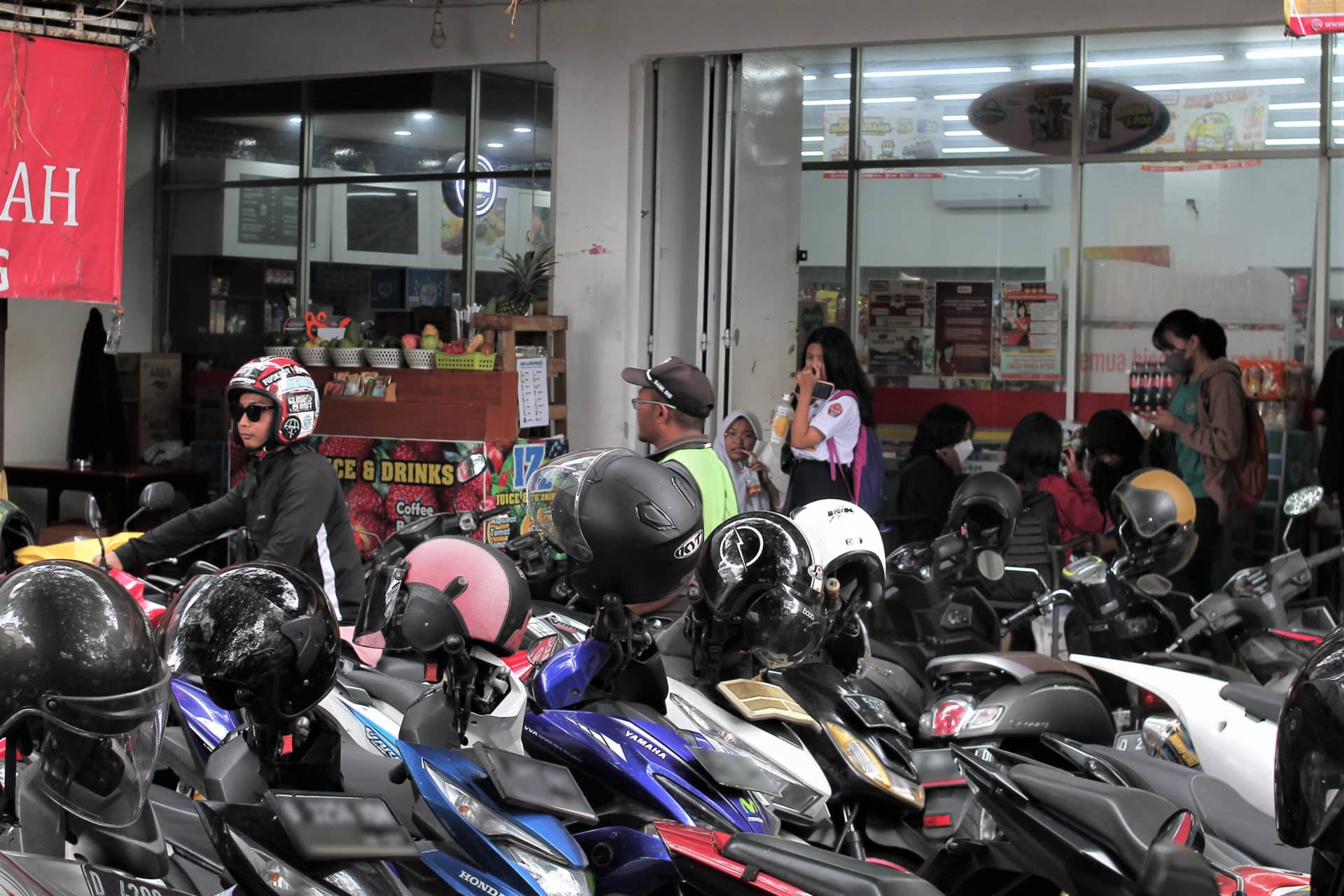
With great adroitness, the man grips the handlebar of the motorbike, and I release my hold on it. He walks the bike over very carefully. His eyes repeatedly watch all over the bike as he makes sure no part of it touches the rump of this damned SUV.
The parking zone for motorbikes is surrounded by a long chain attached to individual poles perhaps half a meter high, forming a rectangle-shaped space. In one spot the chain can be unhooked, which is the entrance. The parking lot attendant too has trouble getting the bike to this entrance, all because of the enormous SUV.
But after he manages it, without causing a single scrape, he positions the bike carefully, lining it up in a row of other bikes. Very tidy. As he walks back to his original spot, the parking lot attendant walks confidently and deliberately, as if he’s a soldier. His boots stomp, like he wants to obliterate all sounds of traffic passing on the main road out front. A day before the weekend Bandung is always even busier than normal, filling with cars from outside the province.
Of all the parking lots I’ve visited, the attendant at this one I feel is most talented. It’s also rare that I see a parking attendant dressed neatly: they usually have faded old T-shirts and look generally unkempt. Whether this man’s position is more formal here, more like a security guard, or it’s just his dress-sense, I don’t know. I’ve thought before to ask him, but have always decided not to. He always greets us warmly whenever we come here. Because of all this, my girlfriend and I aren’t reluctant to hand over some money to this man for his parking lot services. Sometimes, I give more than I should, especially if I entrust to his oversight some other goods that I stow with my bike. For me, a fee of two thousand rupiah – 13 US cents – always feels insufficient given all we get from him.
But I feel sympathetic to any parking lot attendants that I meet – especially those of a more advanced age. I don’t mean that I feel sorry for them, that I look at them in a pitiful or demeaning way like the viewers of those reality TV shows that ‘sell’ poverty. What I really mean is, they remind me of my late father.
To provide a livelihood for his family, my father worked as a security guard in a traditional market. Given a monthly basic wage that was barely anything, he often added hours and jobs to his work burden. In the nights, he drove away thieves, and in the day, he and colleagues stuck parking tickets on vehicles. In short, for almost half my life I was provided for by parking lot attendant money. So I’m always motivated to hand over some coins if I park a vehicle somewhere.
The general view in Indonesia is that ‘parking lot attendant’ is a profession for lazy people. That the work is only blowing a whistle and waiting for vehicles to appear while sipping coffee and chatting about everything under the sun – then asking for a fee. Mostly I think this is a crude stereotype, but there are times when my sympathy gives way to annoyance.
Imagine this: you visit a place where a sign clearly states that parking is free, and park yourself without any assistance, but when you exit, out of the blue, somebody comes and wants money. For sure your mind will ask: wait on, but what did this guy actually do? Or if perhaps you pay using a note or coin that’s larger than the usual fee, but the attendant turns away without giving you your change – what, more or less, do you think your response will be? Let alone if you’re a college student on an austerity budget.
Convenience stores in Indonesia usually have a spot for customers to sit and consume the drinks and snacks they buy there. A coffee shop of sorts, but a more threadbare version. There are usually several benches or tables, placed right beside convenience store goods like big water bottles, gas bottles, and boxes of merchandise yet to be put away by the staff. This sort of place is an alternative to cafés – real cafés, which make college students’ monthly pocket money disappear in a flash – for youths to hang out.
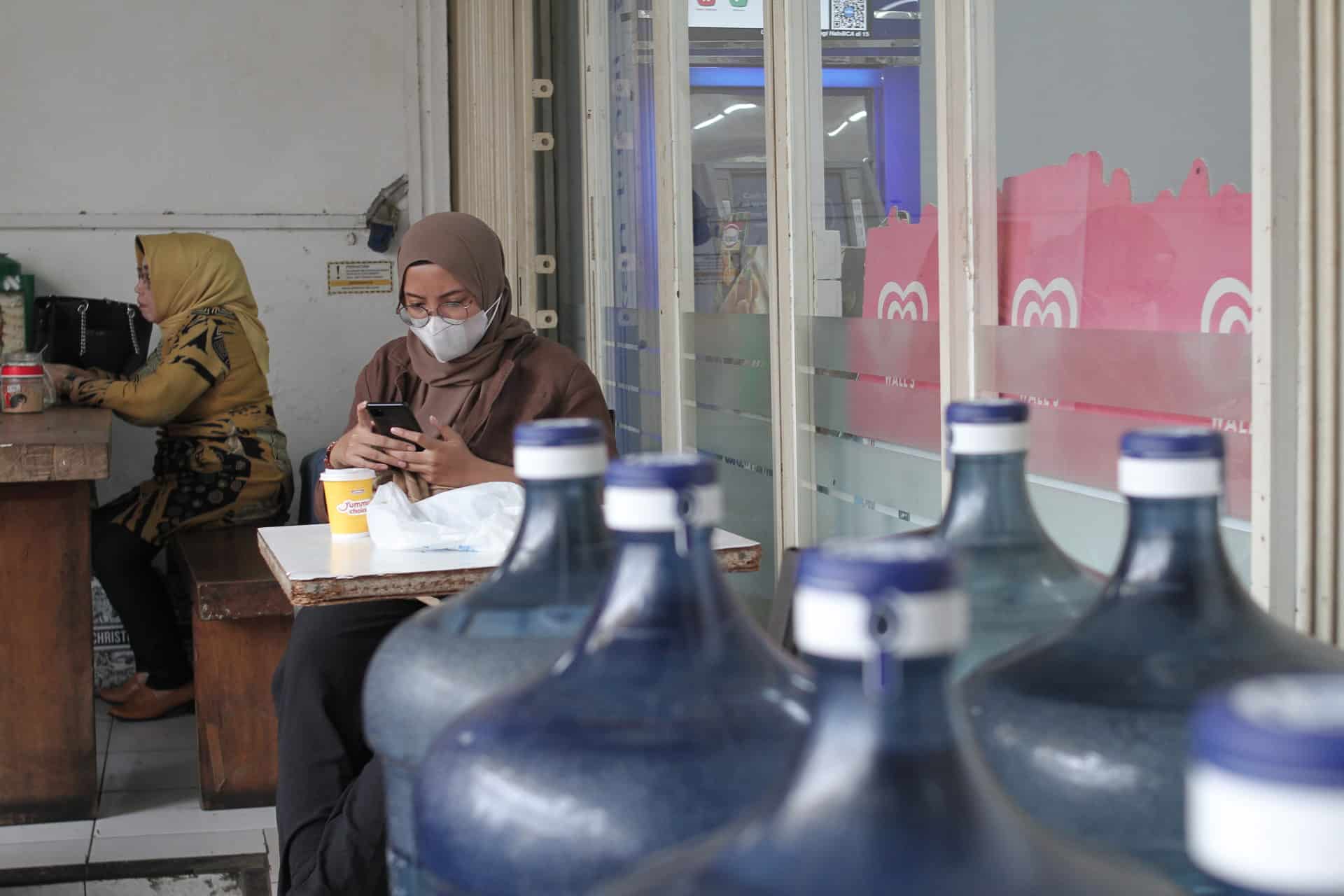
This store has several tables, outside. I use the ATM and then, leaving my girlfriend busy inside buying what she needs, I go out to sit at one. It’s grotty, cigarette butts scattered everywhere. I clean the butts plus some emptied plastic drinks containers left over from the last customers, collecting them all in a plastic bagm, then throwing it into a bin.
After I sit, I see a man, old, hurriedly walking to the parking lot. The man hastily opens the door of his vehicle: that damned SUV. The machine revs into life, and heads off towards the elevated part of Bandung, where there’s lots of tourist places.
My girlfriend comes out carrying a white plastic bag of shopping. I’m also presented with a bottle of iced coffee for us to share, placed on the table while she finds herself a seat. I make out one item in the bag, its rectangular shape visible as it presses against the plastic: ‘oh, you want to cook pasta again, hey?’ She nods. At least once a week we’ll try some new recipe, the result of watching cooking videos on YouTube. We make time to cook together amidst our busy lives: her work, me completing my dissertation.
‘Later you can cut the onion and mushrooms for the sauce, right?’ I give her an ‘OK’ hand gesture, chef-style. Okay, boss.
Seeing her busy calculating the change she has just received, I recall my question from earlier. My suspicion, it turns out, is wrong: ‘Oh yeah, I forgot all about those coins’, she explains. Yet she then immediately adds: ‘but at that supermarket there is a sign, right, that says parking is free. So why should we pay?’
‘Consider it charity’, I say, marshalling the best response I can while grabbing the drink she’s just bought me.
‘But it doesn’t work like that’. And she foams and froths, explaining that two thousand rupiah in coins, if multiplied by the number of vehicles moving through a parking lot… How much money, roughly, would a parking attendant pocket in a month? A fair bit, I’d wager, almost certainly far above my own pocket money.
Aside from the two thousand rupiah itself, I suspect that what also makes my girlfriend take a hardline attitude to this issue is that she had a traumatic experience once with a parking attendant who harassed her. Someone who launched distasteful questions like, ‘Pretty clothes, off to your boyfriend’s kost, honey?’ Unconsciously, she now brings that experience into her interactions with all parking attendants.
My mind returns to the here and now. My girlfriend is still talking about the two thousand rupiah. Part of her face is being hit by fluorescent yellow light emanating from the convenience store. Late afternoon is fast approaching. The streets of Bandung will soon be filled with the evening commute, I think. More traffic jams.
With so many vehicles in this city, parking land is a profitable asset, and one whose rules and origins are happily more clear-cut than crypto. There are legal parking lots – as in, they have some sort of permission from the city government – then there are illegal ones, run in the respective zones of control of different mass organisations, or perhaps more precisely, organised gangs.
‘So’, I needle, ‘why do we happily pay a parking fee if we go to the mall, while two thousand in coins for a parking lot like earlier always becomes a debating point?’
The iced coffee bottle I have been holding all this time I now offer to her across the table. Her right hand reaches out and accepts it.
‘The problem is that it’s usually me who has to cough up the two thousand, dummy!’
Yeah: there’s some truth to that. I so often propose to pay these people, despite the signs saying parking is free. The deference I have for parking attendants leads me – given I’m often broke – to obstinately nag her into parting with her money.
Here there is also a ‘free parking’ sign, except it’s been covered by white paint. Yep, that’s how it is if convenience store owners don’t have a good relationship with the mass organisations or their government representatives: they will have to surrender some of their place of business to become a field of extortion. With justifying excuses like share your good fortune with the people, or help empower local people.
‘This isn’t about me being stingy or calculating every penny, you know’, she says. ‘I just can’t be bothered dealing with these parking attendants and their ways. Don’t I always pay whenever we come to this convenience store?’
‘…Yep’.
‘But at the supermarket before I wasn’t going to, because that sign is clear as day saying parking is free, and we were only popping in there. To park only a minute, then be asked for money: it’s annoying. And it feels like coercion’.
I just nod my head as she explains.
‘But I can’t stop feeling uncomfortable running off without paying’, I say, ‘even if I feel annoyed as well’. I don’t have the heart to avoid the attendants in part because, as I understand it, they need to divide the results of their sweat with the gangsters who control them. Not to mention the cuts taken by others – police, officials – so that the racket is permitted to continue… Ah, but all this is an open secret.
‘I understand’, she says. ‘You’ve said before you’re always reminded of your father, right, if you see a parking attendant who’s older?’
I nod again. Imagining that families of parking attendants will be depending on their daily takings, those sets of two thousand rupiah in coins, disturbs me.
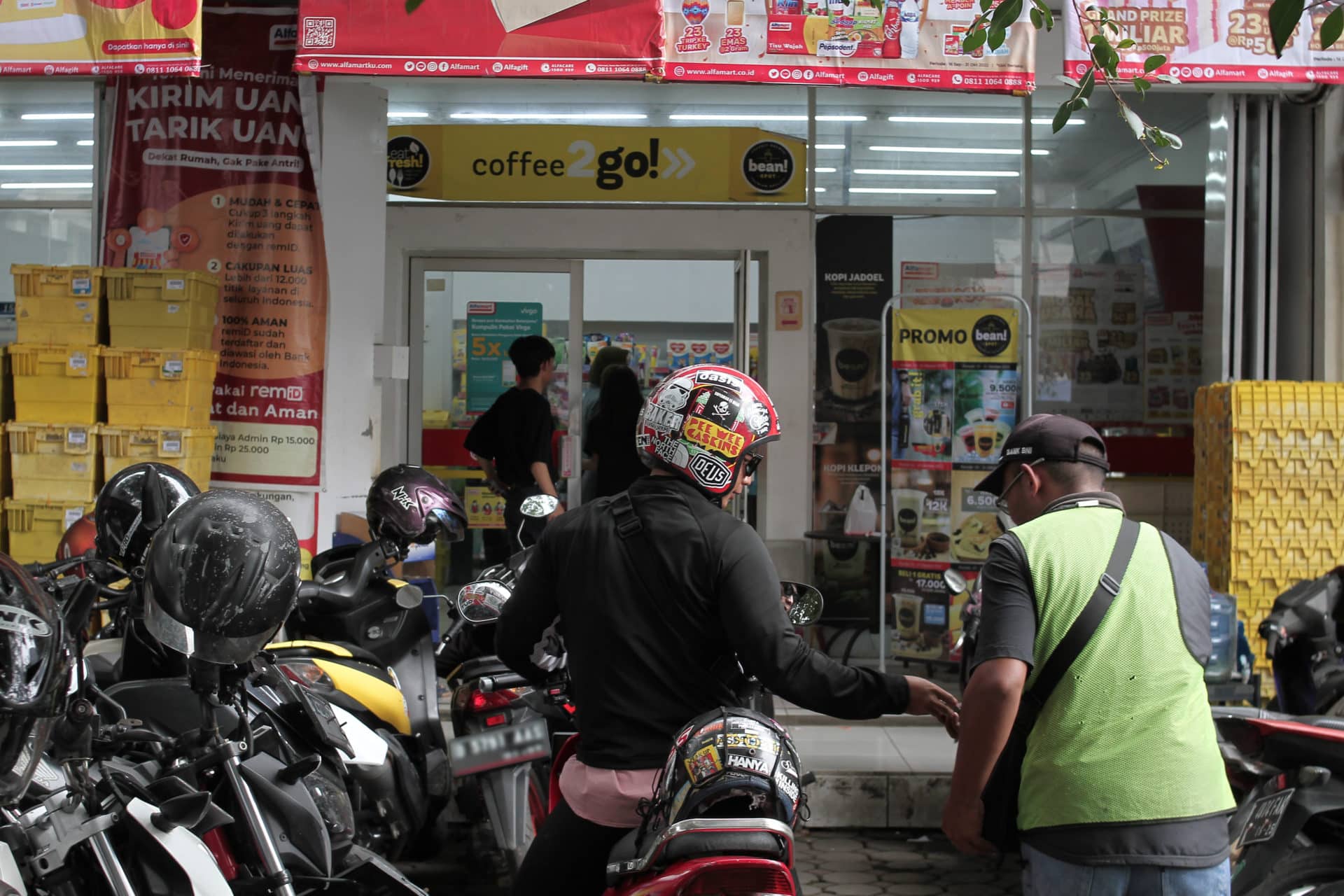
‘Yeah’, I say. ‘That’s the gist of it, more or less’.
A sudden discordant sound in our ears halts our little debate. I see a pair of beggars walking toward the convenience store. While approaching they sing in a harshly-loud volume, like they don’t know what pitch is. An empty candy jar that one of them holds slowly fills with peoples’ money. The noise of a ukulele played tunelessly accompanies the Sundanese song they sing:
‘Rather than us stealing, it’s better that we beg! Rather than living from money that’s haram, better we sing and make money that’s halal!’
Before the beggars get to us, my girlfriend and I look at each other. We understand each other clearly: let’s get out of here.
I leave behind what’s left of our drink: we walk together to our motorbike. I look to the parking attendant, signal to him that we want to leave. He comes over, and begins to move a bike which is lined-up next to and pressed closely against ours.
My head is still turning over the lines sung by those beggars: rather than… rather than... Rather than raking over matters again with my girlfriend, this time I will pay the parking fee myself. My wallet, which usually feels very light, is now heavy, filled from the ATM with a fee from a project that’s just come to pass. Ahhh: life’s problems feel so much more manageable if you have money.
I give a note to the parking attendant, being careful to show him respect. ‘Thankyou’, I tell him.
He accepts it with a smile, puts it in his fanny pack. With a whistle, blown several times, he drives away all other vehicles from our path as we reverse out. Once we’re clear, I look into the motorbike’s side-mirror. There, I see that another black SUV has emerged behind us, and is waiting impatiently. They’re all the same.
On a whim, I drive the bike very slowly, so the black car is obstructed. Let him fume a little. Let him see what it’s like. It’s very satisfying, to prank dumb self-important people like that.
Before I step on the gas, the attendant says, half-yelling: ‘stay safe!’
‘Thankyou!’ we reply – both of us.
© Fikry Ainul Bachtiar
English translation © Lise Isles




